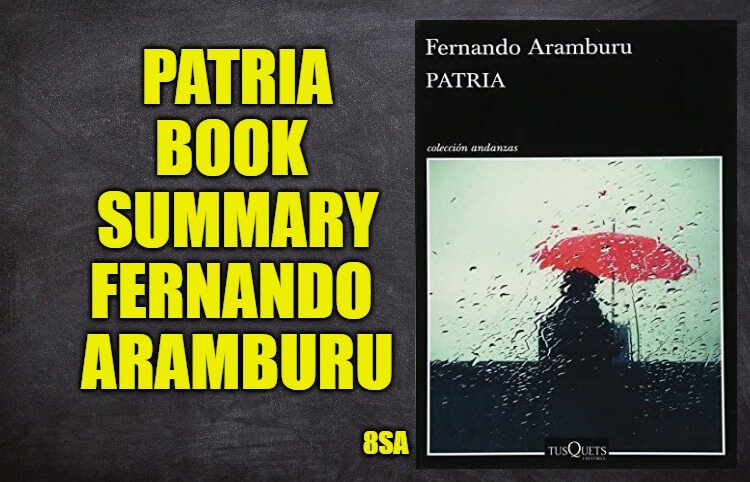What is the summary of the book Patria written by Fernando Aramburu? Information about the summary, characters of Patria.

Patria
“Patria” is a novel written by Spanish author Fernando Aramburu, published in 2016. The book tells the story of two Basque families who are torn apart by the violence of the Basque separatist movement, ETA, which seeks to establish an independent Basque state.
The novel is set in the town of Guipuzcoa in the Basque Country, and it follows the lives of the two families over the course of thirty years. The story is narrated from multiple perspectives, including those of the victims of the ETA violence, the members of the separatist group, and their families.
The central theme of the novel is the destructive impact of violence on individual lives and communities. Aramburu portrays the violence of ETA as senseless and tragic, and he highlights the human cost of the conflict. The novel also explores themes of guilt, forgiveness, and the difficulty of moving on from the past.
“Patria” was widely acclaimed upon its publication and has been translated into many languages. It was a finalist for the prestigious Premio Planeta literary award and won the National Prize for Spanish Literature in 2017.
Book Summary
“Patria” is a novel by Fernando Aramburu that tells the story of two families living in the Basque Country of Spain. The novel is set against the backdrop of the Basque separatist movement, ETA, which seeks to establish an independent Basque state. The story is narrated from multiple perspectives, and it explores the lives of the two families over the course of thirty years.
The novel begins with the murder of Txato, a businessman who is killed by ETA militants in front of his wife, Bittori, and his daughter, Nerea. Txato’s murder has a profound impact on his family and the wider community. Bittori is left to raise her children alone, while Nerea struggles to cope with the trauma of witnessing her father’s murder.
The novel then jumps forward in time to the present day, thirty years after Txato’s death. Bittori has moved away from the Basque Country, but she decides to return to her hometown to visit her husband’s grave. Her return to the town is met with hostility from some members of the community, who blame her family for cooperating with the police in the aftermath of Txato’s murder.
As Bittori tries to come to terms with her past and reconcile with her estranged children, the novel delves into the complex history of the Basque separatist movement. Aramburu portrays the violence of ETA as senseless and tragic, and he highlights the human cost of the conflict. He also explores the motivations of the militants, their families, and their victims, showing how the violence of the conflict has affected everyone involved.
Throughout the novel, Aramburu explores the theme of guilt and forgiveness. Bittori struggles with the guilt of not being able to protect her husband and the guilt of having left her children behind. The novel also shows the impact of the conflict on the families of the ETA militants, who must come to terms with the actions of their loved ones. Through the characters’ struggles to forgive and move on, Aramburu explores the difficulty of finding closure after years of conflict.
As the novel progresses, the tensions between the two families escalate, and the past comes back to haunt them. The characters must confront the consequences of their actions and the pain that they have caused others. Through the novel’s complex web of relationships and perspectives, Aramburu portrays the impact of the Basque conflict on individual lives and communities.
In conclusion, “Patria” is a powerful and thought-provoking novel that explores the complex and tragic history of the Basque separatist movement. Through its multiple perspectives and vivid characterizations, the novel provides a nuanced and compassionate portrayal of the conflict and its impact on the lives of those involved. It is a story of loss, guilt, and forgiveness that speaks to the human experience of living through times of conflict and trauma
Characters
Here are the main characters in “Patria” by Fernando Aramburu:
- Bittori: The protagonist of the novel, Bittori is the widow of Txato, who was murdered by ETA militants. She moves away from the Basque Country but returns years later to visit her husband’s grave and try to reconcile with her estranged children.
- Miren: Miren is Bittori’s childhood friend, and her husband Joxian is a member of ETA. Miren’s family is torn apart by the conflict, and she struggles with the guilt of her husband’s actions.
- Joxian: Miren’s husband and a member of ETA, Joxian is involved in the murder of Txato. He is haunted by his actions and the impact they have had on his family and community.
- Nerea: Txato and Bittori’s daughter, Nerea witnesses her father’s murder as a child and struggles with the trauma in the years that follow.
- Gorka: Bittori and Txato’s son, Gorka becomes involved in the Basque separatist movement as a young man. He becomes estranged from his family and struggles to reconcile his beliefs with the violence of the conflict.
- Arantxa: Gorka’s wife, Arantxa is a nurse who becomes involved in a support group for victims of ETA violence.
- Xabier: Joxian and Miren’s son, Xabier becomes involved in ETA as a teenager. He struggles with the guilt of his actions and the impact they have had on his family and community.
These are just a few of the many characters in “Patria”. The novel is notable for its complex web of relationships and perspectives, which give a nuanced and multifaceted portrayal of the Basque conflict and its impact on individual lives and communities.